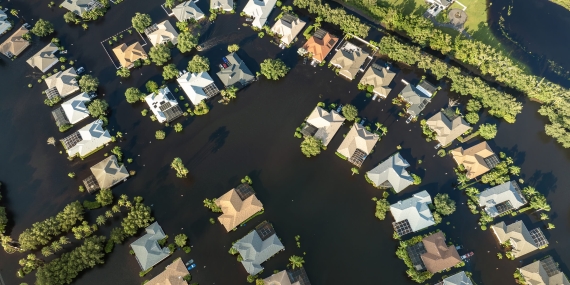Extreme weather conditions are becoming more frequent and severe across Germany, posing significant risks to commercial buildings. As climate change intensifies, the vulnerability of structures to weather-related impacts grows.
Among these structures, stadiums play a crucial role in hosting major events, including regional and global football tournaments.
The UEFA Euro 2024, just concluded in Germany, provides a unique opportunity to assess the preparedness of German stadiums against present and future climate events.
In this article, we focus on the Red Bull Arena in Leipzig (a hosting venue for the Euro 2024), analysing its resilience to climate-related risks using our Physical Climate Risk platform Spectra.
Hazard Projections in Leipzig
Between 2020 and 2100, the intensity of extreme weather events is projected to increase, affecting several regions in Germany.
For this exercise, we have assessed the Red Bull Arena's physical risk exposure with Spectra. The climate scenario adopted was RCP 8.5, undefended, in 2050.
The hazard breakdown highlights medium risk for river flooding, surface flooding and North Atlantic storms, with expected annual losses amounting to €4.2 million. This metric represents the annual damage from physical risks expected in the 2050s.

With Spectra's score rating, you can immediately see what hazards are most likely to cause damage to the asset. Additional metrics on severity, probability and model accuracy give more context to the picture.
For the Red Bull Arena and Bundesliga fans it's not great news: the stadium is likely to face 0.19m deep flooding and strong winds of 144.90 km/h, which could damage the infrastructure.
These climate risks could lead to unusable facilities, expensive repairs, and broader issues affecting the stadium's reputation, attractiveness to attendees, and long-term investments.
- The heightened vulnerability to climate-related hazards threatens the reliability and safety of the stadium during major events like UEFA Euro 2024.
- Concerns over potential disruptions, safety risks to spectators, and damage to infrastructure could deter both fans and investors.
- Repeated occurrences of weather-related incidents may lead to reputational damage, impacting the stadium's appeal as a reliable venue for future events.

Loss Projections and Adaptation
Football can certainly be an accelerator for sustainability […] There are lots of things for us to consider. It's difficult – but I'm certain we can have an impact."
Simon Rasch, Environmental Sustainability Manager, German Football Association (DFB)
From the above impacts, Red Bull Arena faces a substantial financial burden in maintaining and repairing its infrastructure in the face of increasing climate risks.
These costs could not only affect operational budgets but also potentially divert resources from long-term investments in stadium upgrades and enhancements.
As climate events are more frequent and severe, the financial sustainability of the Arena could become increasingly precarious, potentially limiting its ability to maintain competitive standards and attractiveness for football events and investments in the future.
Ultimately, the Stadium management must consider adaptation measures and fortify against escalating climate risks to sustain its role in the competitive landscape of international sports venues.
Climate risk is business risk, across a variety of industries.
Infrastructure and Asset owners and managers can partner up with Climate X to instantly access detailed physical climate risk data that supports strategic decisions, as well adaptation options with our innovative module Adapt. On-demand data simplifies the complex analysis process, making it actionable for decision makers.
- Access precise climate risk data to accelerate financial and operational decisions. This agility is crucial in a rapidly changing climate landscape.
- Prioritise resilience to ensure long-term sustainability and competitiveness. This way, your assets can better withstand future climate impacts, maintaining functionality and appeal.
- Demonstrate proactive climate adaptation measures to reassure event organisers and investors. A commitment to sustainability strengthens the Stadium’s brand, attracting high-profile events and investments.
Next Steps
Banks and real estate firms such as Standard Chartered, CBRE, and Virgin Money leverage our unique climate risk workflow solution, integrating Spectra’s physical risk assessments to identify risks and utilizing Adapt to uncover high-ROI adaptation measures and CapEx opportunities for mitigation planning.
Learn more today to start building resilience in your business.

Our Latest Articles & News
A selection of some of our latest articles covering industry, policy and climate science - written by us.
CBRE expands Climate Risk assessment capabilities with Climate X agreement
CBRE today announced expanded capabilities to provide climate risk data for property investors and occupiers to accelerate sustainability planning, reporting and decision-making.




